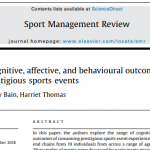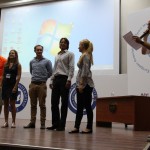The latest ABS Journal Guide has lifted an article first-authored by Dr. Tim Breitbarth to be the single most-cited paper in the only 3* journal in the field of sport business.
Considering all major citation databases, Tim’s paper “The role of corporate social responsibility in the football business: Towards the development of a conceptual model” co-authored with Phil Harris in European Sport Management Quarterly (2008) is leaving the strongest footprint in the academic community.
Dr Tim Breitbarth from the Faculty of Management is a regular author, guest editor, project leader, track convener at international conferences as well as invited speaker on CSR in general and CSR in sport.
Full reference:
Breitbarth, T. & Harris, P. (2008): The role of corporate social responsibility in the football business: Towards the development of a conceptual model. European Sports Management Quarterly, 8(2): 179-206.
Abstract:
Corporate social responsibility (CSR) has attracted considerable interest in the management discipline, but has rarely been evaluated and explored in the sports management research arena. In evaluating the sports, management and marketing literature, this article considers the role of CSR in professional football. It argues that an increased awareness and integration of CSR into the football business fosters the competitiveness of the game and creates additional value for its stakeholders. The article proposes a conceptual model which outlines the agency role of football in order to create political, cultural, humanitarian and reassurance value. Empirical evidence supporting the model is applied based on case studies from four key countries that currently dominate the shaping of CSR discussion and are vital for the game itself: England, Germany, Japan and the US. The article’s aim is to encourage sports management to see CSR as an opportunity-driven concept, which can assist in achieving better strategic direction, and outlines areas where future research can improve sport management’s appreciation of this rapidly more important topic.
 New staff-student events management paper in the highest impact factor sport management journal
New staff-student events management paper in the highest impact factor sport management journal BU Sport Students and Academic Succeed at European Association for Sport Management Conference in Istanbul
BU Sport Students and Academic Succeed at European Association for Sport Management Conference in Istanbul










 Up2U: New BU academic publication
Up2U: New BU academic publication New BU midwifery paper
New BU midwifery paper BU academic publishes in online newspaper in Nepal
BU academic publishes in online newspaper in Nepal Final day of the ESRC Festival of Social Science
Final day of the ESRC Festival of Social Science Using Art to enhance Research
Using Art to enhance Research ECR Funding Open Call: Research Culture & Community Grant – Application Deadline Friday 12 December
ECR Funding Open Call: Research Culture & Community Grant – Application Deadline Friday 12 December MSCA Postdoctoral Fellowships 2025 Call
MSCA Postdoctoral Fellowships 2025 Call ERC Advanced Grant 2025 Webinar
ERC Advanced Grant 2025 Webinar Horizon Europe Work Programme 2025 Published
Horizon Europe Work Programme 2025 Published Horizon Europe 2025 Work Programme pre-Published
Horizon Europe 2025 Work Programme pre-Published Update on UKRO services
Update on UKRO services European research project exploring use of ‘virtual twins’ to better manage metabolic associated fatty liver disease
European research project exploring use of ‘virtual twins’ to better manage metabolic associated fatty liver disease